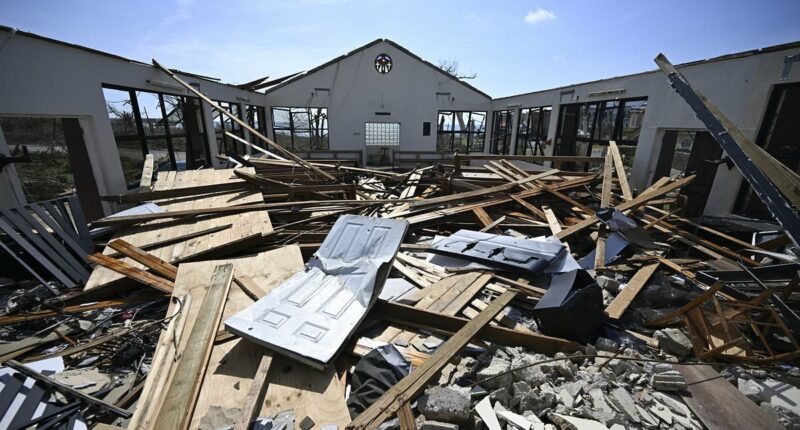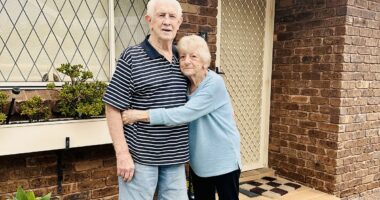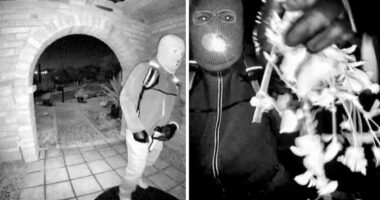Share this @internewscast.com
In the wake of Hurricane Melissa’s destructive path through the Caribbean, Jamaica has been struck by widespread looting as the island grapples with the aftermath of the storm. Thousands find themselves without essential resources such as food, water, and electricity.
The hurricane, a formidable category five, particularly ravaged Jamaica’s southwestern region, leveling homes in St. Elizabeth and Westmoreland. Entire communities have been left isolated, with critical infrastructure severely disrupted.
In the face of annihilated shops and impassable roads, locals express their growing frustration and desperation over the delay in receiving government aid. Many say they have been stranded for days without access to necessary supplies.
A resident from Black River in St. Elizabeth described the dire circumstances as “chaos, chaos. Total. No food. No water,” highlighting the urgent need for assistance.
“We don’t have access to money. We need help. No help has come,” she added, underscoring the severity of the situation.
Individuals in the affected areas have reported to the BBC that no aid trucks have yet reached them. In the coastal town nearly 150 kilometers (93 miles) west of Kingston, residents have resorted to scavenging for food amidst the debris lining the roads.
Others made their way inside battered supermarkets, taking what they could for themselves.
‘We have to use whatever we see here, on the street and also in the supermarket,’ a resident explained.

Looting has erupted in Jamaica after Hurricane Melissa ripped through the Caribbean, leaving towns in ruins and thousands without food, water, or power. Pictured: The destroyed Whitehouse Seventh-day Adventist Church in Westmoreland, which was used as a shelter during the passage of Hurricane Melissa, is seen in the aftermath of the hurricane

The category 4 storm devastated Jamaica’s south-west, flattening homes in St Elizabeth and Westmoreland and cutting off entire communities. Pictured: Residents move a mattress from damaged property in the aftermath of Hurricane Melissa in the community of Cave in Westmoreland

With shops destroyed and roads blocked, desperate residents say they’ve been left for days without food or clean water – complaining that the government aid is yet to reach them. Pictured: Dorothy Headley, 75, prepares a meal of cow liver over a wood fire as damaged property is seen in the background in the aftermath of Hurricane Melissa in Westmoreland
He said he and others had to climb into a shop due to its roof caving in and took what they could.
Nearby, others told of a local pharmacy being looted, describing anarchy as people ran in and out carrying armfuls of drugs and alcohol.
Planes and helicopters carrying humanitarian aid headed to Jamaica on Friday, three days after Melissa slammed into the island nation and killed at least 19 people.
Information Minister Dana Morris Dixon told a briefing that authorities had ‘quite credible’ reports of possibly five additional deaths but had not yet been able to confirm.
‘We’re still at 19 confirmed, but we do expect that will change today,’ she said.
Kingston’s international airport, which reopened Thursday, has already received 13 cargo relief flights, and at least 20 more are expected Friday, according to Transportation Minister Daryl Vaz.
All three of the island’s international airports were set to resume operations by Saturday morning, he added, for both humanitarian and commercial flights.
The United States was sending between eight and 10 helicopters to the Caribbean nation that would be large enough to transfer patients.
‘I would say to all of those persons who are still out here waiting and looking up in the sky that you will start to see’ and ‘hear a lot of activity,’ he said.
‘You probably are feeling that you are forgotten. You are not forgotten.’
The hurricane hit western Jamaica the hardest, and people there remain cut off with communications and electricity down.
‘The devastation on the west is unimaginable,’ said Morris Dixon, adding her thanks for the incoming aid: ‘The relief and the support that we have gotten is overwhelming.’
Hurricane Melissa swiftly became one of the most powerful storms on record, reaching an intensity scientists said was made four times more likely because of human-caused climate change.

Some residents told the BBC said they have seen no aid trucks in the area so far and described having to eat what food they can find in debris by the roads in the coastal town, nearly 150km (93 miles) west of the capital, Kingston. Pictured: The destroyed Whitehouse Seventh-day Adventist Church

An aerial view shows damaged buildings in the aftermath of Hurricane Melissa in Lewis Town, St Elizabeth, Jamaica, on October 31, 2025

An aerial view shows damaged buildings in Savanna-la-Mar, Westmoreland, Jamaica, on October 31, 2025
The system roared through the Caribbean and has claimed the lives of at least 49 people across the region.
It devastated parts of Jamaica as well as Cuba, and as of Friday was moving rapidly away from Bermuda.
Cuba worked on Friday to rescue residents still stranded by unprecedented floodwaters in the wake of Hurricane Melissa, including a flooded river that had cut off one of the country’s most important east-west thoroughfares.
The Rio Cauto overflowed its banks shortly after Hurricane Melissa, one of the strongest storms on record to make landfall in the Caribbean, slammed into Cuba as a dangerous Category 3 hurricane, bringing upwards of 15 inches of rain to some areas of the eastern end of the island.
Emergency workers on Friday waded waist deep in wetsuits and used boats and military vehicles to rescue residents from the still-rising waters of the country’s longest river.
The floodwaters had cut off a principal route connecting the capital Havana in western Cuba with the eastern cities of Santiago, Bayamo and Guantanamo, forcing motorists and rescue workers to seek alternate routes to the north.
Rio Cauto resident Eduardo Verdecia, 83, said he and his family had expected the river to subside but continuing rains, plus runoff from nearby mountains and a fast-rising reservoir had surprised them.
‘When night fell we thought it would go down, but look at it now, and it’s still raining,’ Verdecia said, indicating chocolate waters that had inundated his house to near roof level.
‘We’ve had floods before but nothing like this. My house had never flooded.’
Authorities said on local radio that upwards of 800 people had been evacuated from riverside towns and warned that the river could keep rising, but said the reservoir dam would not burst.
Cuba has reported no deaths from Melissa, which had begun to dissipate in the Atlantic Ocean on Friday after sowing devastation across much of Jamaica, drenching Haiti and leaving at least 50 dead.
Across eastern Cuba, authorities prior to the storm mobilized a massive evacuation effort, moving 735,000 people to shelters outside the hurricane’s predicted path. Tourists along Cuba’s northern keys were also relocated to inland hotels.
Recovery from the severe flooding to infrastructure and crop damage will be complicated by a dire economic crisis that has already led to shortages of food, fuel, and medicine across the island.
Officials said several countries including Venezuela and United Nations agencies had offered aid to the communist-run nation.
The U.S. State Department said on Thursday it was also ready to offer to help those affected by Hurricane Melissa in Cuba – a close neighbor but long-time foe of the United States.
Cuba’s deputy director of U.S. affairs Johana Tablada said on Friday that the administration of President Donald Trump had not yet followed up with details.
‘The U.S. has not made any concrete offers, nor has it responded to the questions we raised regarding the announcement made by the secretary of state,’ Tablada told reporters in Havana.

















